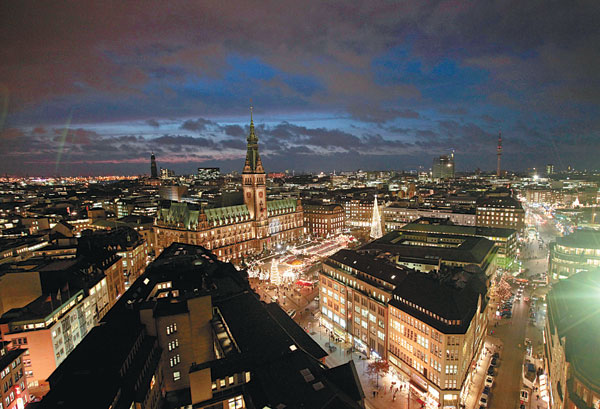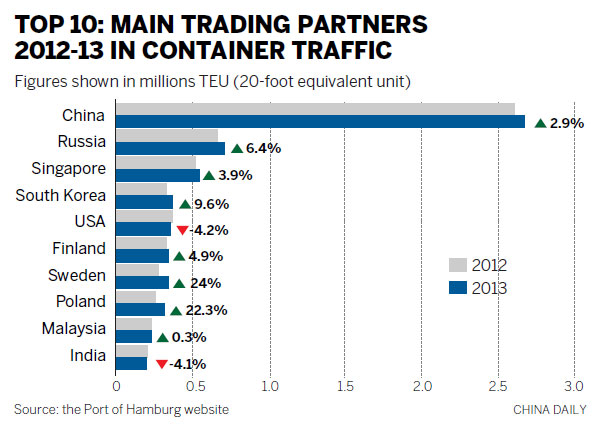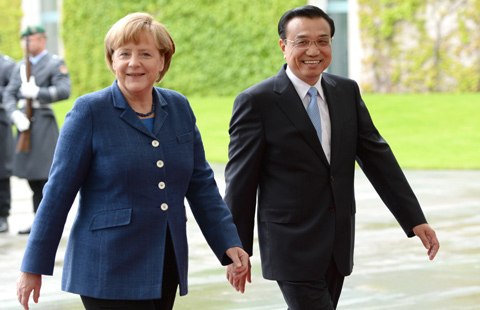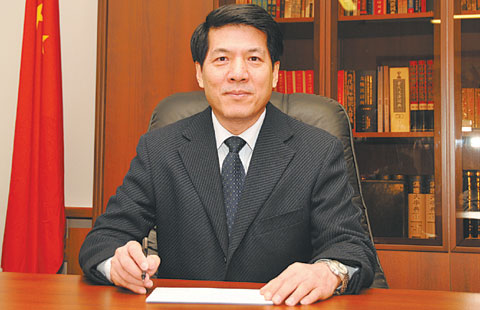
Historic port city hosts top summit
Comments Print Mail Large Medium Small
Chinese Premier Li Keqiang was due to deliver a key speech at the Hamburg Summit. Provided to China Daily

European business leaders await insights on China's latest policies and business opportunities
The Hamburg Summit on Oct 10-11 takes place at a strategically important time, as Chinese Premier Li Keqiang delivers the keynote speech on the second day and relations between China and Europe are closer than ever.
The biennial high-level conference on Sino-European economic relations held in Hamburg is hosting Li for the first time as it celebrates its sixth meeting in 10 years.
At the summit, Li is expected to elaborate on China's domestic economic situation and the central government's decisions and strategies for additional reform and opening-up. Li is also expected to offer proposals for further development of China-European Union relations.
More than 500 political and business leaders, including a 70-plus Chinese delegation, are expected at the summit, the biggest Sino-European business meeting.
"The Hamburg Summit always has a very strong impact. It has very high visibility. I am expecting that Li's personal visit to Hamburg will give another upgrade to the event," says Stefan Matz, director of the international department of HWF Hamburg Business Development Corporation, which offers a comprehensive service package for companies intending to locate in the Hamburg metropolitan region.
"I think everybody has very high expectations of Li," says Matz.
German business leaders have said they think Li's speech at the summit will give Europeans more detailed insight on Chinese governmental policies, especially reform and economic transformation policies, and also make clearer the opportunities available for European companies in the coming years.

"The sixth Hamburg Summit will be held almost a year after the Third Plenum of the Chinese Communist Party and the announcement of the huge reform package," says Jens Assmann, deputy director of the international department of the Hamburg Chamber of Commerce.
Alexandra Voss, chief representative of the Delegation of German Industry and Commerce Beijing, says: "For the future, we perceive many opportunities for new or increased business cooperation between companies from both countries as China continues its transformation into an innovation-led economy."
German companies are excellent partners for cooperation in China's strategically important industries such as urban infrastructure, green technology and the rapidly modernizing healthcare sector, she says.
"Many German companies are market leaders in these fields, capable of providing the required technology, know-how and experience to advance them. Additionally, the growing spending power of the Chinese middle class offers a vast potential to expand business for example, import of German consumer products."
In the past 10 years, many Chinese state leaders have attended the summit to promote and emphasize the importance of Sino-German and China-EU political and economic exchange and cooperation.
The summit was a joint initiative of the former German chancellor Helmut Schmidt, the mayor of Hamburg and the Hamburg Chamber of Commerce in 2004 to intensify the economic and political dialogue between Europe and China and improve the economic relationship.
The summit is also considered a platform for attracting more Chinese investment and promote two-way trade. One of the goals is to get Chinese entrepreneurs to come to Hamburg while looking for a location to set up their German or European headquarters.
Hamburg has been an important center for Chinese businesses in Europe, Assmann says. The city is host to more than 500 Chinese companies. "You will find the European headquarters of large companies like COSCO, China Shipping and Baosteel, as well as many small- and medium-sized Chinese companies in Hamburg."
Hamburg's port is the major hub for Chinese-European container traffic. "Every third container in Hamburg is handled with China. A lot of these imports to Europe are destined to the Baltic Sea region, to Central and Eastern Europe, as well as to all other parts of Europe," Assmann says.
Voss says: "Trade and investment relations between German and Chinese companies are strong, and we expect them to continue to thrive."
China is Germany's most important trading partner in the Asia-Pacific region, and Germany is the biggest trade partner of China in the EU.
Matz believes there is still huge potential for trade in both directions.
In China's huge market, there is a very high awareness and appreciation of the "Made in Germany" stamp on such products as the car industry and machinery, Matz says.
There are huge opportunities and trade related to Chinese-German businesses in China, and a major part of that is handled by the port of Hamburg and by the city of Hamburg and via companies based there.
"On the other hand, there is also, vice versa, a very strong use of Hamburg to penetrate into different markets from the Chinese side," Matz says.
"I would say that Hamburg is probably the location that has benefited most from the political, and consequently the economic, changes in the last 20-25 years."
Carolynn Look and Laura Davis contributed to this story.
zhangchunyan@chinadaily.com.cn
(China Daily European Weekly?10/10/2014 page8)
Background






